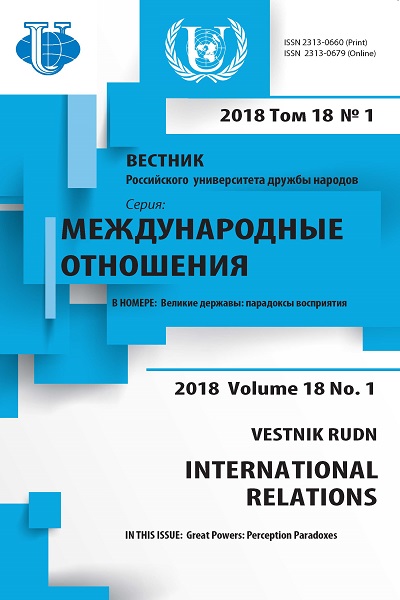Situational Anti-Americanism in the Republic of Korea: origins and causes of decline
- 作者: Lantsova I.S.1
-
隶属关系:
- Saint-Petersburg State University
- 期: 卷 18, 编号 1 (2018): Great Powers: Perception Paradoxes
- 页面: 9-18
- 栏目: THEMATIC DOSSIER
- URL: https://journals.rudn.ru/international-relations/article/view/18373
- DOI: https://doi.org/10.22363/2313-0660-2018-18-1-9-18
- ID: 18373
如何引用文章
全文:
详细
The article discusses main theoretical approaches to the concept of Anti-Americanism, including situational Anti-Americanism, i.e. critique of not America as such, but rather of its particular actions. It demonstrates that Anti-Americanism that has emerged in the Republic of Korea is of situational type. While in the first decades of the Cold War South Korea was one of the most pro-American states in the world, it started to change in 1980s. The article links emergence of Anti-Americanism in the country to U.S. support to the authoritarian political regime in South Korea in times, when ever greater part of the population started demanding democratization. A focus is given to 2000s, when Anti-Americanism gained significant popularity in the country. It demonstrates that situational Anti-Americanism is the dominant type of it also nowadays. In recent years declining popularity of Anti-Americanism has been characteristic to South Korea society. The article links this tendency to the failure of the six-party talks on North Korean nuclear program, to rising tensions on the Korean Peninsula and in Northeast Asia in general, and, most importantly, to the progress that the Korean people’s Democratic Republic has achieved in development of its missile and nuclear technologies. At the same time, it concludes that as long as U.S. troops remain in South Korea, and as long as political and economic ties between the Republic of Korea and the U.S. remain as close as they are today, situational Anti-Americanism will remain characteristic to South Korean society.
作者简介
Irina Lantsova
Saint-Petersburg State University
编辑信件的主要联系方式.
Email: islanko@mail.ru
PhD in Political Sciences, Senior Lecturer of the Department of American Studies of the Faculty of International relations of Saint-Petersburg State University
参考
- Cho, Kisuk (2015). A Model on the Rise and Decline of South Korean anti-American Sentiment. Korea Observer, 46 (2), 233—264.
- Dubin, B. (2002). Anti-Americanism in European culture after the World War II. Monitoring of public opinion: economic and social changes, 3, 44—50. (In Russ.).
- Global Public Back U.S. on Fighting ISIS, but are Critical of Poat-9/11 torture. Pew Research Center. URL: http://www.pewglobal.org/2015/06/23/global-publics-back-u-s-on-fighting-isis-but-are-critical-of-post-911-torture/ (accessed: 30.11.2017).
- Hwang, Balbina Y. (2003). Anti-Americanism in Korea: Implications for the Future of the U.S.—ROK Alliance. East Asia. An International Quarterly. 20, 60—73.
- Jhee, Byong-Kuen (2008). Anti-Americanism and Electoral Politics in Korea. Political Science Quarterly, 123 (2), 301—318.
- Kane, T. (2006). Global U.S. Troops Deployment, 1950—2005. Report Defense. The Heritage Foundation. URL: http://www.heritage.org/defense/report/global-us-troop-deployment-1950-2005 (accessed: 30.11.2017).
- Korea South. Diplomatic Handbook. (2005). Washington, DC: Int’l Business Publications.
- Lankov, A. (2004). Anti-Americanism in Seoul style. URL: http://lankov.oriental.ru/d68.shtml (accessed: 27.11.2017). (In Russ.).
- Lantsova, I. (2008). Presidential Election Campaign in the Republic of Korea: Comparative Analysis. Political Expertise: POLITEX, 5(2), 231—243. (In Russ.).
- Oh, Chang Hun & Arrington, C. (2007). Democratization and Changing Anti-American Sentiments in South Korea. Asian Survey, 47(2), 327—350.
- Rubin, B. & Rubin, J.C. (2004). Hating America: A History. New York: Oxford University Press.
- Rubinstein, A.Z. & Smith, D.E. (1985). Anti-Americanism in the Third World: Implications for US Foreign Policy. New York: Praeger.
- Straub, D. (2015). Anti-Americanism in Democratizing South Korea. Shorenstein Asia-Pacific Research Center.
- Whyte, L. (2015). Evolution of the U.S.-ROK Alliance. The Diplomat. URL: https://thediplomat.com/ 2015/07/evolution-of-the-us-rok-alliance-anti-americanism/ (accessed: 29.11.2017).
补充文件








